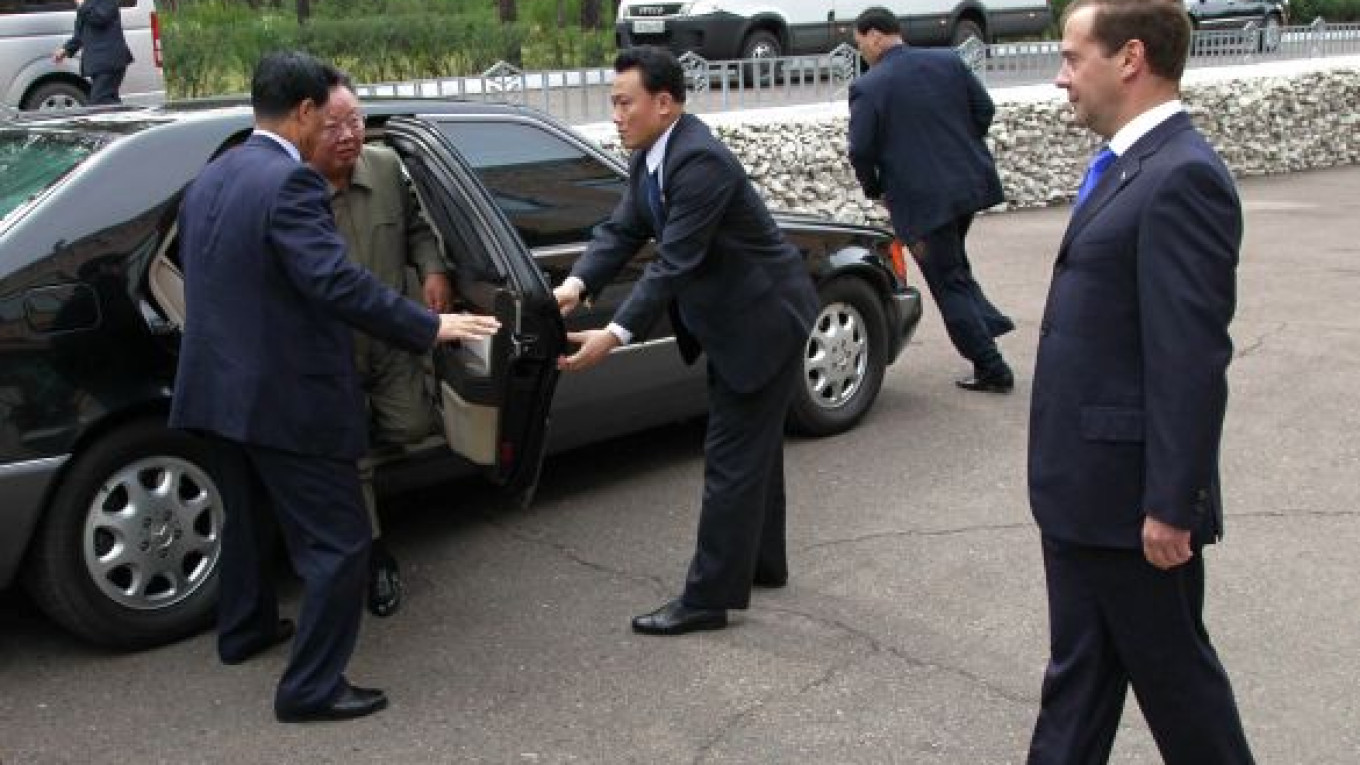North Korea's reclusive leader Kim Jong Il greenlighted the construction of a trans-Korean gas pipeline during talks with President Dmitry Medvedev at a closed Siberian military base Wednesday.
Kim also gave assurances that North Korea was prepared to put a moratorium on the production and testing of nuclear weapons and restart six-party talks on the matter.
While his pledges on nuclear disarmament carry little weight, his agreement to the large-scale economic project, proposed jointly by Russia and South Korea, indicated a radical change in the world's dealings with Pyongyang, analysts said.
The meeting between the two leaders — the first since 2002 — took place at the Sosnovy Bor base outside Buryatia's capital, Ulan-Ude. Kim, clad in his usual beige tunic, arrived in a black armored Mercedes.
"I have the most positive impressions from the meeting," Medvedev reporters after the two-hour meeting behind closed doors. Kim dodged the news conference.
Medvedev and Kim agreed to create a bilateral commission to define details of the pipeline, the Russian leader said, according to a statement on the Kremlin web site. No timeframe was given.
The proposed pipeline will stretch 1,100 kilometers, including a 700-kilometer segment in North Korea, the Kremlin said. Medvedev said Russia could supply 10 billion cubic meters of gas a year.
Kim gave no promises on his country's nuclear program, but said he was ready to restart six-party talks between the two Koreas, Russia, China, Japan and the United States "without preconditions," Medvedev's spokeswoman Natalya Timakova said, Interfax reported. The last round of talks ended in 2008 with North Korea walking out.
North Korea's $11 billion debt to Russia, left over from Soviet times, was also discussed, said Deputy Finance Minister Sergei Storchak. He did not say whether any progress was made.
A possible electricity deal between the two countries was also brought up, news reports said. Kim made a stop on Saturday in Bureya, a town in the Amur region, where he inspected a hydroelectric power plant that might supply North Korea with electricity.
The North Korean leader, known for his aversion to air travel, traversed Russia for almost a week in an armored train to get to Ulan-Ude.
He brought his security rules with him, with train station workers along the way ordered to stay indoors, windows in residents' houses taped shut, and police teeming over the city streets.
In Bureya, he was greeted by young women in ethnic Russian dress who offered him traditional bread and salt and by well-wishers waving Russian and North Korean flags. But those were all "trusty people," yanked from their summer vacations by the welcoming committee to pose as regular locals, St. Petersburg's TV5 television , implying that they were security service officers.
North Korea has been increasingly dependent on China lately, and the pipeline will help diversify its political connections, said Andrei Kortunov, president of New Eurasia Foundation, a think tank.
The pipeline would also give North Korea a little more financial independence through transit fees.
"Instead of demanding something and threatening to use nuclear weapons if they don't receive it, they have been offered an honest way to make money," said Fyodor Lukyanov, editor of the Russia in Global Affairs journal.
North Korea is one of the poorest countries in the world and periodically receives humanitarian aid from abroad, including from Russia. This year's floods have worsened the already dire economy, prompting Russia earlier this month to start shipping 50,000 tons of grain to the country to stave off famine.
The country compensates for lack of economic muscle with nuclear arms program, making the world jittery in the last decade as it actively develops and tests nuclear weapons.
Kim pledged to disarm his nuclear arsenal at a meeting with then-President Vladimir Putin in 2002 but later went back on his promise.
This time analysts also cautioned against taking Kim's words at face value.
"In regimes of this type, where everything depends on one person, it is difficult to predict their behavior," Kortunov said.
Convincing Kim to get rid of nuclear weapons after Libya would be almost unrealistic, Lukyanov said. Libyan leader Moammar Gadhafi got rid of Libya's nuclear weapons in the mid-2000s, only to find himself this year fighting a losing battle against a rebel insurgency backed by NATO bombers.
Nuclear weaponry ensures that a third power is unlikely to get involved in a country's internal affairs, and Kim understands the power of nuclear deterrence, Lukyanov said.
"No one is naive enough to believe anything that Kim says," he said.
But Russia's proposal to build a pipeline shows a new approach in negotiations with North Korea. "The construction won't start today, but the idea is new," Lukyanov said. "The character of negotiations is changing."
A Message from The Moscow Times:
Dear readers,
We are facing unprecedented challenges. Russia's Prosecutor General's Office has designated The Moscow Times as an "undesirable" organization, criminalizing our work and putting our staff at risk of prosecution. This follows our earlier unjust labeling as a "foreign agent."
These actions are direct attempts to silence independent journalism in Russia. The authorities claim our work "discredits the decisions of the Russian leadership." We see things differently: we strive to provide accurate, unbiased reporting on Russia.
We, the journalists of The Moscow Times, refuse to be silenced. But to continue our work, we need your help.
Your support, no matter how small, makes a world of difference. If you can, please support us monthly starting from just $2. It's quick to set up, and every contribution makes a significant impact.
By supporting The Moscow Times, you're defending open, independent journalism in the face of repression. Thank you for standing with us.
Remind me later.


